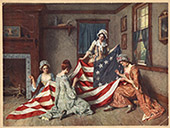Libraries, University of Nebraska-Lincoln
ORCID IDs
Document Type
Archival Material
Date of this Version
1-1842
Abstract
"Primitive Christianity was a very simple thing, apart from the individual errors connected with it; two great speculative maxims set forth its essential doctrines, “Love man,” and “Love God.” It had also two great practical maxims, which grew out of the speculative, “we that are strong ought to bear the burthens of the weak,” and “we must give good for evil.” These maxims lay at the bottom of the apostles’ minds, and the top of their hearts. These explain their conduct; account for their courage; give us the reason of their faith, their strength, their success. The proclaimers of these maxims set forth the life of a man in perfect conformity therewith. If their own practice fell short of their preaching, — which sometimes happens spite of their zeal — there was the measure of a perfect man, to which they had not attained, but which lay in their future progress. Other matters which they preached, that there was one God; that the soul never dies, were known well enough before, and old heathens, in centuries gone by, had taught these doctrines quite as distinctly as the apostles, and the latter much more plainly than the Gospels. These new teachers had certain other doctrines peculiar to themselves, which hindered the course of truth more than they helped it, and which have perished with their authors.
No wonder the apostles prevailed with such doctrines, set off or recommended by a life, which — notwithstanding occasional errors — was single-hearted, lofty, full of self-denial and sincere manliness. “All men are brothers,” said the Apostles; “their duty is to keep the law God wrote eternally on the heart, to keep this without fear.” The forms and rites they made use of; their love-feasts, and Lord’s-Suppers; their baptismal and funeral ceremonies, were things indifferent, of no value, save only as helps."
This early essay is a brief statement of Parker's radical view of Christianity, which led to his controversies with the more orthodox Unitarians of nineteenth-century New England. A brief sketch of the author has been added.



Comments
Originally published in The Dial for January 1842. Reprinted from The Critical and Miscellaneous Writings of Theodore Parker (Boston: James Munroe and Company, 1843), pp. 222–247.